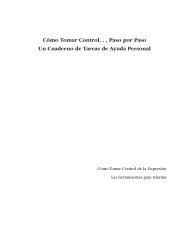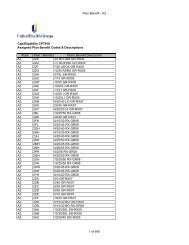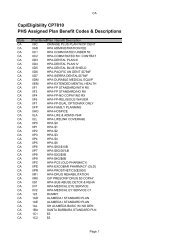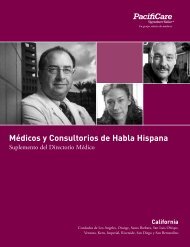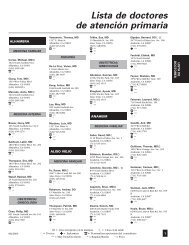CALIFORNIA - Pacificare Health Systems
CALIFORNIA - Pacificare Health Systems
CALIFORNIA - Pacificare Health Systems
Create successful ePaper yourself
Turn your PDF publications into a flip-book with our unique Google optimized e-Paper software.
PART A<br />
82<br />
How Your Behavioral<br />
<strong>Health</strong> Care Benefits Work<br />
Non-Participating Providers. Licensed psychiatrists,<br />
psychologists, marriage and family therapists, licensed<br />
clinical social workers, and other behavioral health<br />
professionals, hospitals, and other licensed behavioral<br />
health facilities which provide Behavioral <strong>Health</strong><br />
Services to eligible Members, but have not entered<br />
into a written agreement with PBHC to provide such<br />
services to Members.<br />
Outpatient Treatment Center. A licensed or certified<br />
Participating Facility which provides a Behavioral<br />
<strong>Health</strong> Treatment Program in an outpatient setting.<br />
Participating Facility. An Inpatient Treatment Center,<br />
Day Treatment Center, Outpatient Treatment Center or<br />
Residential Treatment Center which is duly licensed in<br />
the State of California to provide either acute inpatient<br />
treatment, day treatment, or outpatient care for the<br />
diagnosis and/or treatment of Mental Disorders and/or<br />
Chemical Dependency, and which has entered into a<br />
written agreement with PBHC.<br />
Participating Practitioner. A psychiatrist,<br />
psychologist, or other allied behavioral health care<br />
professional who is qualified and duly licensed or<br />
certified to practice his or her profession under the<br />
laws of the State of California and who has entered<br />
into a written agreement with PBHC to provide<br />
Behavioral <strong>Health</strong> Services to Members.<br />
Participating Providers. Participating Practitioners,<br />
Participating Preferred Group Practices and<br />
Participating Facilities, collectively, each of which<br />
has entered into a written agreement with PBHC to<br />
provide Behavioral <strong>Health</strong> Services to Members.<br />
Participating Preferred Group Practice. A provider<br />
group or independent practice association duly<br />
organized and licensed under the laws of the State<br />
of California to provide Behavioral <strong>Health</strong> Services<br />
through agreements with individual behavioral<br />
health care providers, each of whom is qualified and<br />
appropriately licensed to practice his or her profession<br />
in the State of California.<br />
PBHC Clinician. A person licensed as a psychiatrist,<br />
psychologist, clinical social worker, marriage, family<br />
and child therapist, nurse, or other licensed health<br />
care professional with appropriate training and<br />
experience in Behavioral <strong>Health</strong> Services who is<br />
employed or under contract with PBHC to perform<br />
case management services.<br />
Practitioner. A psychiatrist, psychologist or other allied<br />
behavioral health care professional who is qualified<br />
and duly licensed or certified to practice his or her<br />
profession under the laws of the State of California.<br />
Premiums. The periodic, fixed-dollar amount<br />
payable to PBHC by the Employer Group for or on<br />
behalf of the Subscriber and the Subscriber’s eligible<br />
Dependents in consideration of Behavioral <strong>Health</strong><br />
Services provided under this Plan.<br />
Residential Treatment Center. A residential facility<br />
that provides services in connection with the diagnosis<br />
and treatment of behavioral health conditions and<br />
which is licensed, certified, or approved as such by the<br />
appropriate state agency.<br />
Schedule of Benefits. The schedule of Behavioral<br />
<strong>Health</strong> Services which is provided to a Members under<br />
this Behavioral <strong>Health</strong> Plan. The Schedule of Benefits<br />
is attached and incorporated in full and made a part of<br />
this document.<br />
[Serious Emotional Disturbances of a Child (SED).<br />
A Serious Emotional Disturbance of a Child is defined<br />
as a condition of a child who:<br />
1. Has one or more Mental Disorders as defined<br />
by the Diagnostic and Statistical Manual (DSM-<br />
IV-TR), other than a primary substance use<br />
disorder or developmental disorder, that results<br />
in behavior inappropriate to the child’s age<br />
according to expected developmental norms; and<br />
2. Is under the age of eighteen (18) years old.<br />
3. Furthermore, the child must meet one or more of<br />
the following criteria:<br />
a. As a result of the Mental Disorder, the child<br />
has substantial impairment in at least two<br />
of the following areas: self-care, school<br />
functioning, family relationships, or ability to<br />
function in the community; and either of the<br />
following occur:<br />
i. the child is at risk of removal from home<br />
or has already been removed from the<br />
home;<br />
ii. the Mental Disorder and impairments<br />
have been present for more than six<br />
months or are likely to continue for more<br />
than one year without treatment; or



